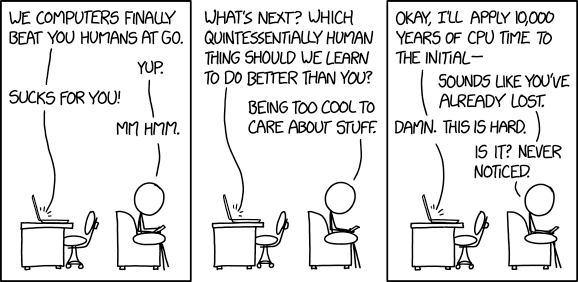CS 470 - Spring 2020.
[Home]
Welcome to CS 470!

Video of the Day
Stravinsky, The Rite of Spring
Poll of the Day
What happened on this date in 1912 that is tangentially related to this course?
https://pollev.com/cs470
You may also download the app to your phone. Use the "cs470" poll id.
Coronavirus
COVID-19 Global Cases by Johns Hopkins CSSE
Google COVID-19 dataset
Lecture : Reinforcement Learning. 4/10/2020
Administrivia
Zoom Guide for Yale Students Sign in using Yale zoom account.
Security and Privacy Implications of Zoom
Some of you took my CS 257 course on Informatation Security.
Apparently zoom is rife with security issues. This article is by
Bruce Schneier who is a leading security guru, not some quack.
- Widely used, including British cabinet meeting.
- Bad Privacy Practices: selling data, sending data to Facebook, treating home pages as marketing websites.
- Bad security practices: third party can turn on Mac user's camera overriding
local security setting, can steal users' Windows credentials,
display LinkedIn data, sloppy encryption: claim AES-256, but use AES-128,
in ECB mode (electronic code book - not a good idea), use servers in China,
have 700 developers in China, who could slip in backdoors a Chinese authorities request.
- Bad user configurations: zoombombing, meeting id's are too short -
hackers can randomly try them - there are tools for this!
I have office hours Wednesdays from 4-6 pm, via zoom, standard meeting id: 316-021-726
ULA office hours - also on zoom. See the
[Contact Info and
Schedule] as well as piazza. The zoom office hours meetings are
posted on canvas, under zoom. If you have trouble connecting, post a
note to piazza or email cs470help@cs.yale.edu.
[Assignments].
Exploring reports of bugs in learning.py code for perceptron and others. See posting on piazza about
slicing out feature columns that are not inputs.
Extension to Sunday April 12th at 11:59pm.
hw7 has been posted:
hw7.html reinforcement learning.
Extension to Sunday April 19th at 11:59pm.
CS 570 project assignment is also available in [Assignments].
So far thirteen have been submitted and approved.
On Friday April 17th, we will have a guest lecture by Professor
Marynel Vázquez. She will discuss her research on detecting human
spatial formations typical of conversations and describe how this
is useful for HRI. Below are the main papers she will cover.
Final Exam: Friday May 1, 2pm
The final exam will be open book and take home. I will provide more
information about the scope in the coming weeks.
In light of the Universal Pass policy, there will be no final exam.
- The primary function of the final exam is to be able to distinguish among the students in the class.
- Contrary to accepted wisdom, final exams (and studying for final
exams) is not an effective learning method. At this point, you have
some theoretical appreciation for how learning works. The human
brain is a highly adapted learning machine. As we discussed,
it is wired to learn from mistakes and similary, with reinforcement
learning (or operant conditioning) to learn from reward and
punishment.
- When you are studying for an exam, your brain actually knows
that you are studying for an exam. Your brain knows when the exam
is going to occur. Your brain also knows that after the
exam, you have little use for the facts and knowledge you have
crammed into your head. Therefore, being a well-oiled machine, your
brain puts the crammed knowledge in a short term memory location which
is readily accessible during the exam, but can be freed up after
the exam.
- To put it in the technical language of memory management, your
brain will garbage collect most of what you prepared.
- So, what's the point? Well the stuff that I really want
you to learn has been reinforced through the problem sets,
and the lectures. I try to tell stories. The human brain
has evolved to process episodic memory more effectively than
dry semantic facts.
- Also, there are practical skills that I have tried to inculcate
in this course, including:
- Python programming and object oriented programming. The AIMA
code provide very good examples.
- Jupyter notebooks. Comments and documentation are a positive
force in the universe. Jupyter notebooks facilitate the
combination of text and code. This idea was pioneered years
ago by none other than Donald Knuth. He called it
literate programming in 1984.
- X Windows. For many of you, using jupyter notebooks remotely
from the zoo required you to learn a bit about X Windows,
developed at MIT in 1984 as well.
- LaTeX, the text formatter offshoot of TeX, also
developed by Knuth.
- mathplotlib. A powerful python module for plotting.
- github. You may not realize it, but in tackling
the current homework assignments, you will often find yourself
in the vicinity of github. Make yourself welcome there.
- The point is, I was not going to test you about any of
this stuff. My nefarious plan was to convince (not coerce) you
that you would be a better person for learning these tools and
techniques.
- Finally, as stated above, cognitive science research
indicates that people learn from failure. Good judgment comes from
experience. Experience comes from bad judgment.
Thus, like it or not, I try to make you fail. I give you
vague directions. I point you at code that might not work.
(Frankly, I was surprised that the AIMA perceptron code was buggy.
It looks like they removed it from the next release.)
- Here is the big reveal: my role is not to get you
to learn computer science or artificial intelligence. My role is
to get you to love CS and AI. I decided that giving a
final exam under the present circumstances was no longer
instrumental to that goal.
Lecture: Reinforcement Learning
Readings: chapter 21
2019 Scassellati Slides:
rl.html
gym.html
FrozenLake.html
[Home]
